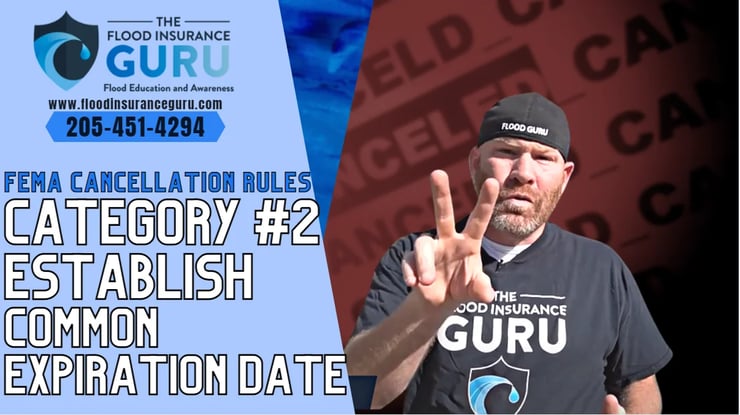FEMA Cancellation Reasons: Category #2 - Common Expiration Date
January 5th, 2022
3 min read
By Chris Greene

We moved out of the legacy program of the Federal Emergency Management Agency (FEMA) and are now officially going to adopt the Risk Rating 2.0 program for the federal flood insurance. In our previous blog, we were able to establish what's changing with these cancellation reasons with the Risk Rating 2.0 program.

Other than the changes coming to the overall rating structure of flood policies with the National Flood Insurance Program (NFIP), we're also going to see some changes to cancellation reasons.
Today, we want to focus on Category #2 of FEMA Cancellation Reasons: Establishing a Common Expiration Date. Let's talk about it.
Category #2: Expiration Dates and More
When it comes to flood policies, it's important that you have the correct effectivity and expiration dates. This is a matter of life and death when it comes to your property's status.
When we say effectivity date, we're simply talking about when you're policy is going to start covering flood damages that may occur on the insured building or property. On the other hand, the expiration date is when the flood policy will no longer take effect when it comes to coverages to flood loss.
The thing about these dates is that it's pretty common to get it mixed up and two policies will be written for the same property with different effectivity and expiration dates. This isn't allowed even in private flood insurance.

In order to resolve this issue, FEMA and NFIP handles the situation by canceling the other policy. The policy that will be canceled won't be based on when it was written, but whichever has the higher coverage.
Simply put, you will take up the FEMA flood policy that has higher flood insurance coverage for your insured building no matter what. This also means that the approved policy's expiration date will be followed and the rejected one will be canceled.
If you ever get into the situation where your policy is written for two different expiration dates, one obviously needs to get canceled. In the NFIP Legacy Program or NFIP version 1.0, the cancellation will be written with Reason Code #03.
What's Changing?
When it comes to the updated cancellation reasons for Risk Rating 2.0, Reason Code #03 will be changed into what's called Category #2. Generally, the numbering was moved up because the previous Reason Code #2 already gets covered in Category #1 alongside Reason Codes #01 and #07.
In order to have a policy canceled due to Category #02, the policy must meet two conditions:
1. The insurer must remain the same for the new flood policy with the same or higher amounts of coverage. The agent must submit a new application and premium.
This simply means that your insurance agent must submit a new application finalizing your flood policy application to FEMA and NFIP in order to match the correct expiration date and the higher coverage limits for your property.
This condition also means that you can no longer change to another insurer. Generally, condition #1 asks the insured and agent to simply correct any mistake within the flood policy, especially the expiration date.
2. The other insurance coverage for which the common expiration date is established must be for building coverage on the same building insured by the current in-force flood policy.
You can cancel your policy however according to condition #2, FEMA Cancellation Category #2 will only be written to establish the same expiration date of the policy. You can't insure a property that's different from the current one you have.

Having the correct dates and coverage on your policy is really important and getting it wrong will only cause you more headaches once floodwater starts to inundate your property. Having two different expiration dates can mean that your policy will already lapse when you need it the most and you're not going to get covered.
These changes can be confusing, so if you need help understanding how flood insurance work and how your FEMA policy can be canceled, where to buy flood insurance, understanding your risk of flooding, or anything related to floods, click below to access our Flood Learning Center.
You can also click my picture below to call us for your flood insurance concerns.
Remember, we have an educational background in flood mitigation which lets us help you understand your flood insurance, how it can be managed, flood risks, and mitigating your property to preserve its value long-term.



